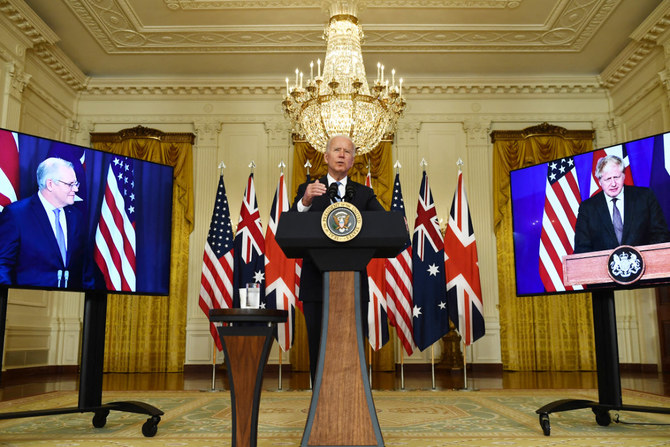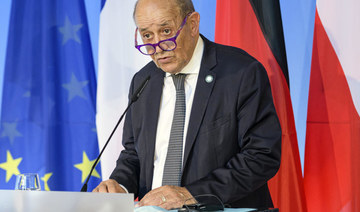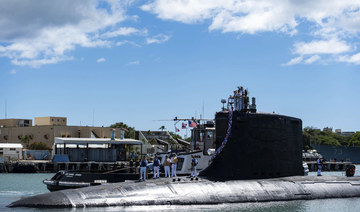LONDON: The reaction of France to the new trilateral security pact between Australia, the UK and the US brings to mind a powerful cartoon published by an American newspaper during the Trump years, when the US president was ruling by executive order to evade Congress.
The cartoon, which appeared in the Buffalo News, depicted the Statue of Liberty, a gift from the people of France to the US, stabbed in the back not with a dagger but with the president’s pen. Just like Lady Liberty in this cutting depiction, the French must feel as though a dagger is buried between their shoulder blades.
French Foreign Minister Jean-Yves Le Drian on Friday likened the new Indo-Pacific security alliance, known as AUKUS, to a “stab in the back” and the sort of betrayal that “is not something allies do to each other.”
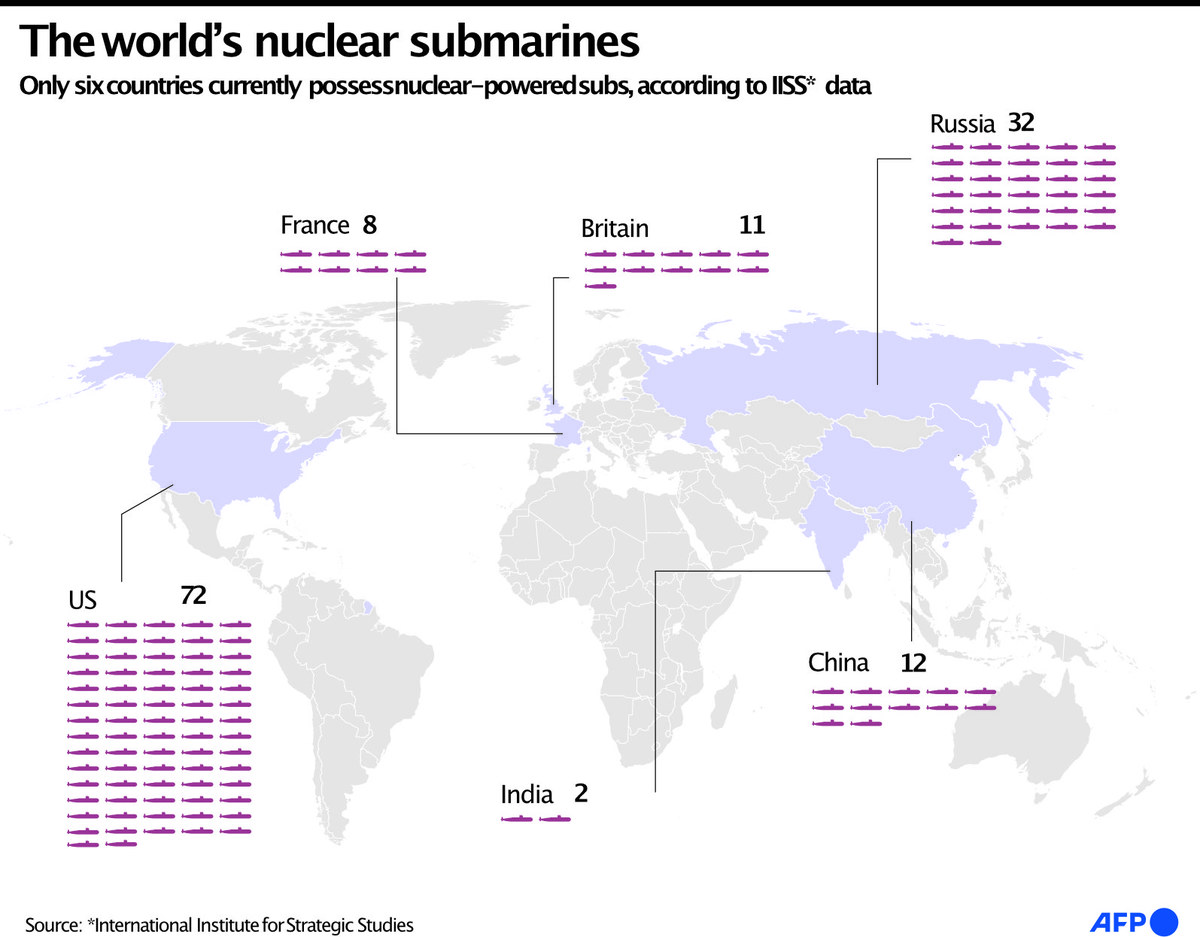
Because of “the exceptional seriousness of the announcements made on Sept. 15 by Australia and the United States,” Le Drian announced that Paris would immediately recall its ambassadors to the US and Australia for consultation.
French grievances over the deal relate both to its strategic and financial implications. Paris was not only excluded from the Indo-Pacific strategy but has also lost out on a hugely lucrative contract with Australia to build nuclear submarines. Canberra is tapping American tech instead.
The new alliance, announced during a virtual meeting of US President Joe Biden, British Prime Minister Boris Johnson and Australian Prime Minister Scott Morrison, has ignited a firestorm of criticism from France.
While many observers in Washington applauded the pact as a clear challenge to China, others warned that the agreement marks the beginning of a new arms race in the region, or perhaps even a strategic blunder hot on the heels of America’s Afghanistan withdrawal debacle.
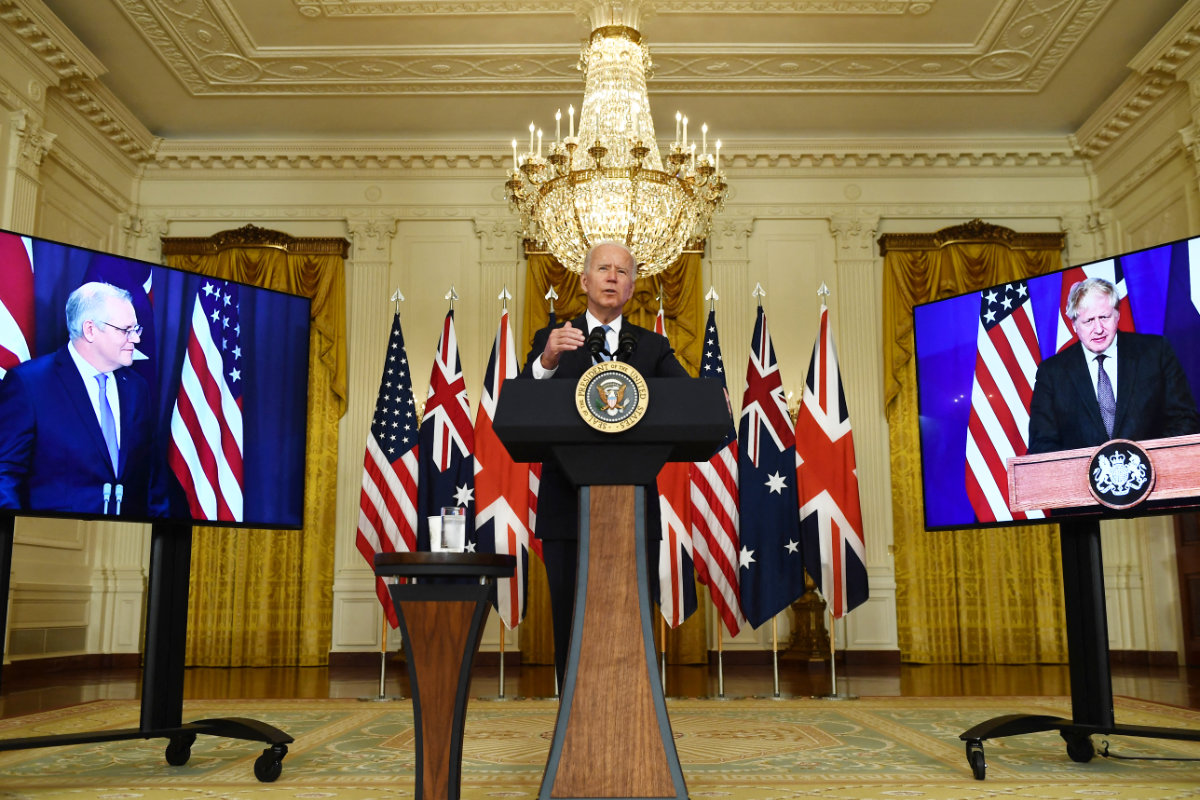
US President Joe Biden participates is a virtual press conference on national security with British PM Boris Johnson (R) and Australian PM Scott Morrison on Sept. 15, 2021. (AFP)
Since taking office, Biden has sought to reset America’s frigid relations with its oldest European allies, yet the AUKUS move appears to have had the opposite effect, alienating France and the wider EU.
It has also exposed a potential rift between the US and its European allies on how to handle the growing influence of China. Differing positions on whether to confront or cooperate with Beijing might, as the New York Times recently put it, “redraw the global strategic map.”
The timing of the AUKUS deal could not have been more critical, coming as it did on “the eve of the publication of the EU strategy in the Indo-Pacific, and as Paris has risen as the main EU strategic actor in the region,” wrote Benjamin Haddad, director of the Europe Center at the Atlantic Council.
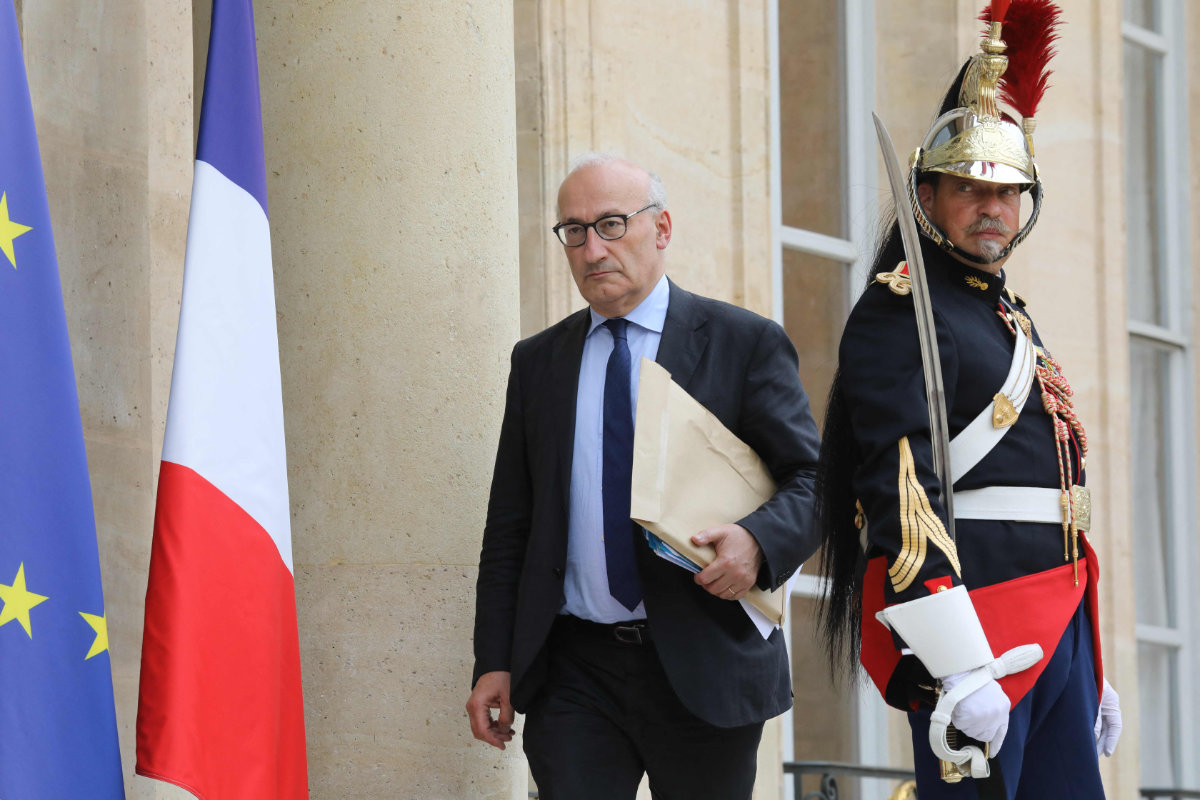
France's ambassador to the US, Philippe Etienne, has been recalled to Paris for consultations amid a US-France diplomatic row over the sale of submarines to Australia. (AFP file photo)
He predicts the new dynamic will “create a blow to transatlantic strategy in the region and create a lasting hurdle in US-French relations.”
Next week, the White House is due to host the first in-person meeting of leaders of the Quadrilateral Security Dialogue, a strategic alliance between the US, Japan, Australia and India. “The Quad,” as it is known, is another important pillar of Biden’s China policy.
Beijing views the Quad, and the new AUKUS, as a “clique based on a Cold War ideology and detrimental to the international order.” China’s regional rival India, meanwhile, predictably welcomed the new alliance.
Although Biden, Johnson and Scott did not mention China in their AUKUS announcement, the pact was described in the US as part of the president’s policy to “refocus” American national security and to reorient its military posture toward the Chinese threat.

China's increasingly expanding navy and aggressive actions beyond its borders has spurred the US, Japan, Australia and India to form a strategic alliance. (Shutterstock image)
The administration has sought to justify its abrupt departure from Afghanistan on the grounds that it needs to pool its resources to address the threat emanating from China. Critics might have given the Biden team the benefit of the doubt had the new strategic architecture in the Indo-Pacific not come at the expense of US-French relations.
France has good reason to be upset. The new deal with Australia, described as “historic” by the US media and “another step by Western allies to counter China’s strength,” torpedoed the largest military contract Australia has ever awarded — a deal for nuclear submarines worth 90 billion Australian dollars ($65.5 billion), signed in 2017 with the French defense contractor Naval Group.
The US media played down the French reaction to AUKUS and chose not to ruminate over what sort of message the deal might send to America’s allies elsewhere. Instead it focused on the historic nature of the sharing of US nuclear-propulsion technology with Australia.
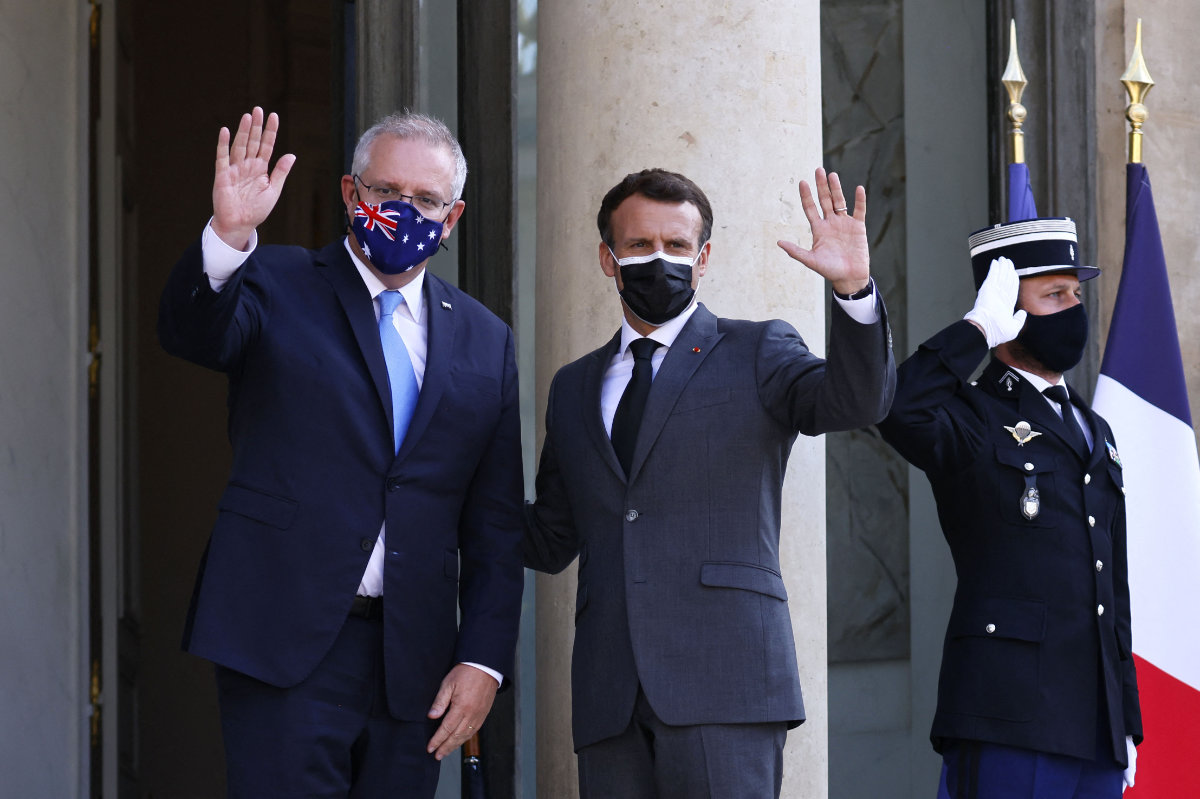
French President Emmanuel Macron welcomes Australia's Prime Minister Scott Morrison at the Elysee Palace in Paris on June 15, 2021. (AFP)
Defense News hailed the deal as the first time the US has shared this type of technology with any ally since the US-UK Mutual Defense Agreement of 1958.
Barry Pavel, director of the Scowcroft Center for Strategy and Security at the Atlantic Council, likewise drew a parallel between the new pact and the Eisenhower administration’s policy of sharing nuclear technology with the UK, a policy that caused French President Charles de Gaulle to decry “Anglo-Saxon nuclear cooperation and propelled France to develop its own nuclear capabilities.”
Indeed, much like de Gaulle, French President Emmanuel Macron might well interpret the AUKUS deal as a deliberate Anglo-Saxon snub that undermines its strategic posture in the Indo-Pacific.
France is not a minor player in the region. It is the only European country with a big presence in the Indo-Pacific, including about 7,000 soldiers on active deployment.
Cutting France out of the new strategic architecture represents a blow both to Paris and to Macron, who had prided himself on fostering a good relationship with Biden. The perceived snub could backfire badly for the Anglo-Saxon trio by pushing the French president to seek alliances elsewhere.

Daphné class French submarine under construction in Lorient, France. (Shutterstock photo)
Many observers had expected more from the Biden administration after its chaotic withdrawal from Afghanistan, and the damage this caused to America’s global standing and perceptions of its commitment to its allies. Instead, AUKUS looks like more of the same.
Biden’s secretary of state, Anthony Blinken, is a francophone who grew up in Paris and has long enjoyed good relations with the French. This had raised hopes of a new flourishing of ties between the two governments. Instead, relations have hit rock bottom.
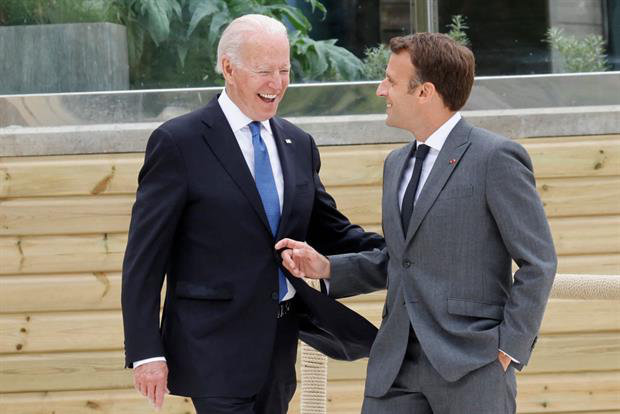
US President Joe Biden and French President Emmanuel Macron meeting like long-lost friends during then G-7 summit in Cornwall, UK on June 13. (GETTY IMAGES/AFP/File Photo)
The perceived betrayal seems all the more cruel when one takes into consideration how much America has gained from its French connection during the war on terror. In Africa especially, it is French forces who have led operations against Daesh affiliates. Only this week, Macron announced the assassination of Adnan Abu Walid Al-Sahrawi, the leader of Daesh in the Sahara, who had been accused of killing four Americans.
In Washington, foreign policy watchers currently interpret the rift with Paris as a “tactical error and not a strategic mistake.” But the French beg to differ.
When Blinken recently posted a tweet calling France a “vital partner” in the Pacific, Gerard Araud, the outspoken French former ambassador to Washington, responded sarcastically: “We are deeply moved.”
As Washington sets about redrawing the strategic map in the Indo-Pacific, it would perhaps be wise not to take its oldest friendships for granted. Indeed, if America cannot be counted on to stand by its allies, Washington could find itself short of friends when push comes to shove.






